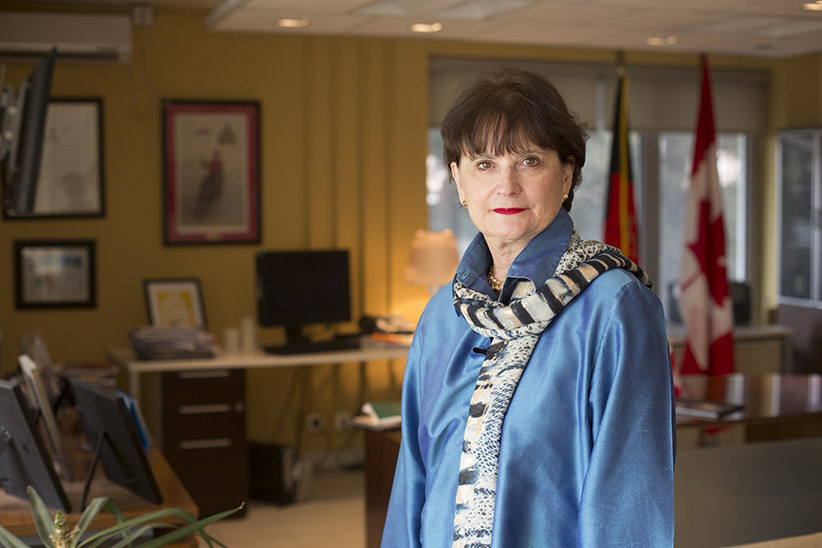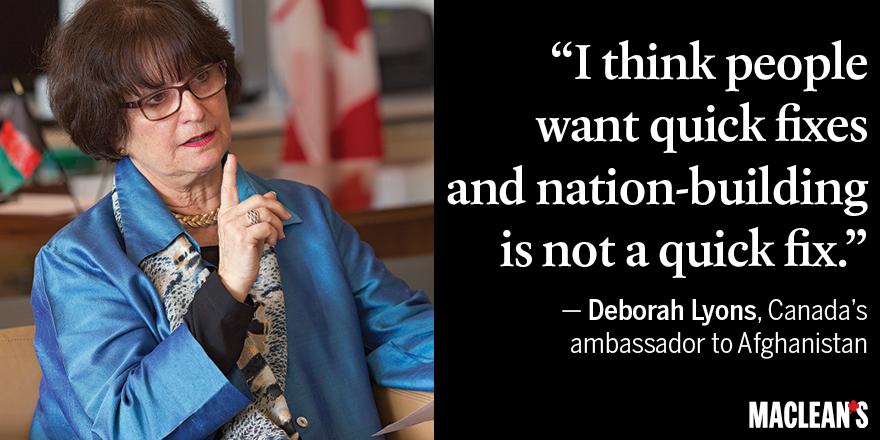The Interview: Canadian ambassador to Afghanistan Deborah Lyons
Ambassador Deborah Lyons on corruption and investment in Afghanistan, the country’s new president, and critics who dismiss Canada’s military effort there
Canadian Ambassador to Afghanistan Deborah Lyons at the Canadian Embassy in Kabul. Photograph by Joel van Houdt/Getty Images
Share

Some analysts say this is the turn-around year for Afghanistan. Others claim the country is a lost cause. Maclean’s asked Canada’s ambassador to Afghanistan, Deborah Lyons, for a 2015 report card. The former deputy head of mission at the Canadian embassy in Washington, she is the only female ambassador in Afghanistan and has a no-nonsense point of view. Journalist Sally Armstrong interviewed Lyons in Kabul.
Q: The NATO troops are gone, president Hamid Karzai is gone and there’s a new government. How is that going to affect Afghanistan in 2015?
A: First, the Afghan National Security Forces [police and army] will have to establish their control of, and lead on, the security front—a very important test for them. Second, the new national unity government, which represents a broad base of Afghans, needs to implement their reform agenda in a way that reflects they can truly work as one team to give Afghans confidence in their future. This is a big year.
Q: You’ve been here for 17 months; what major changes have you seen?
A: Our military departure was a big moment for Canada and a time to honour the great legacy of 40,000 soldiers who served here. But Canada has not left Afghanistan; in fact, we restated our commitment to our diplomatic and development partnership with Afghans. Here in Afghanistan, there was: an unprecedented 75 per cent turnout to vote in the presidential election, the peaceful democratic transfer of power when the national unity government took office; the end of NATO’s International Security Assistance Force in December; and the full transfer of power to Afghan national security forces. Some of these changes cannot help but bring about a sense of uncertainty. Although I am impressed with the significant advances on the development side—notably, in education, health and governance—one has to be realistic that a lot of challenges still remain.
Q: What are those challenges?
A: Addressing the weak economy is key; the new government has committed to this. Corruption continues to be a major problem in both weakening the economy and in causing people to lose confidence in their institutions; President Ashraf Ghani has come out strongly against corruption. And the ongoing Taliban insurgency remains a major challenge.
Q: Most of the world has a very negative view of the mission in Afghanistan. Why is that?
A: Well, I think people want quick fixes and nation-building is not a quick fix. A lot of progress has been made. Almost nine million kids are in school, 40 per cent are girls. In 2001, none of those girls was in school. Twenty-five per cent of the parliamentarians are women and, in the last election, 20 per cent of the provincial council members were female. These are big accomplishments, but they don’t get the media attention that an insurgent attack or a suicide bomber gets. This country has endured nearly four decades of war and, yet, in comparison with other post-conflict countries, the development indicators of progress here have been remarkable.

Q: Several analysts are dismissing Canada’s military effort here as a failure. How would you respond to those people?
A: I think you have to look at the facts. Afghanistan is no longer a safe haven for international terrorists. That was a critical military objective and it has been achieved. Also, Afghanistan is taking control of its own defence, [and] Canada played a major role in training the Afghan national security forces. From a development perspective, consider: Life expectancy has jumped from 45 to 60 years, maternal mortality is down 70 per cent, polio has almost been eradicated due to a vaccination program in which Canada played a lead role, GDP has increased fivefold in the last decade and Afghan women are making advances. These improvements would never have been possible without the increased security that was brought about by the military mission. I do not see this as failure; I see this as progress.
Q: What can President Ghani do that president Karzai was unable to do?
A: President Ghani is a new leader with a fresh new mandate and lots of new ideas. He is very committed to economic development and has highlighted fighting corruption as one of his top priorities. He is committed to a new, more open partnership with the international community. His quick attention on the Kabul Bank fiasco [owners and insiders were caught stealing] and the direct firing of people who were engaged in corruption set the stage for this cancer to be addressed. He has moved very quickly to establish a new level of trust between the Afghan government and the international community with the signing of the bilateral security agreement and the status of forces agreement, a strong contrast to president Karzai’s resistance. This constructive tone bodes well for the future.
Q: What about the shared leadership in the presidential palace: a Pashtun [Ghani] and a Tajik [Abdullah Abdullah], an intellectual and an enforcer? Is this a case of two is better than one?
A: That remains to be seen, but both men have stated their commitment to making this government work. Their partnership began with compromise because of the failing of the electoral process. They both bring a broad base of support, a wide range of ethnicity, of representation from the regions and from special interests. However, in the early days, the ongoing political wrangling over the formation of the cabinet has kept the government from performing its basic functions and has eroded some public confidence in the ability of these two leaders to work together.If they can build a genuine partnership, they have a tremendous opportunity to bring real, positive change to Afghanistan.
Q: There is a feeling the Taliban are poised to come back, that they are waiting at the gate.
A: Currently, we are seeing an increase in the insurgency. However, I think it is a bit extreme to say they are waiting at the gate. There are a number of factors we need to look at. There is little support for the Taliban among the Afghan population. There is a very robust civil society, a very strong and independent media and the Afghan national security forces are stronger than ever before. However, the Taliban are still capable of carrying out attacks that kill large numbers of people. The Afghan government is open to a political solution and has indicated that if the Taliban do three things—reject violence, cut their ties with terrorist organizations and respect the Afghan constitution—formal peace talks can begin. What’s more, recent talks between Pakistan’s and Afghanistan’s political leaders, and China’s offer to support talks with the Taliban, are encouraging signs. However, I expect a continued tense atmosphere in Kabul and around Afghanistan.
Q: You are very focused on women and girls.
A: Advancing the rights of women and girls is one of the top priorities of Canada’s foreign policy here. The government of Canada has taken a global leadership role in promoting maternal, newborn and child health, as well as in the fight against child, early and forced marriage. My work here is to assist the Afghan women in attaining their rights. President Ghani has signalled his intention to appoint a woman to the Supreme Court and to increase the number of women in the cabinet. He even encourages the role of his wife as first lady, something Afghans have not seen for a very long time.
Q: Why should Canada care about Afghanistan?
A: Canada is invested in Afghanistan on many levels. We must ensure that the blood and treasure has not been in vain. But also, Afghanistan is in a critical geopolitical location: Its neighbours and near neighbours include three nuclear states (China, Pakistan and India) with a combined population of several billion people. Instability in this region would have profoundly negative consequences for the global economy. Stability in the region will have a great impact on global security. Regional and economic co-operation could unlock tremendous opportunities for the world economy, including for Canadian companies.
Q: What do the Afghan people have to deal with right now?
A: President Ghani came out of the gate—declaring his commitment to new investment in Afghanistan, to major infrastructure projects, to working co-operatively in the region—but much has to be done to build a strong, business-friendly environment. Producing a more realistic budget, tackling corruption and addressing serious electoral reform prior to the parliamentary elections are prerequisites to Afghans (and the international community) feeling confident in the ability of President Ghani and Chief Executive Abdullah to form the genuine partnership the national unity government needs to lead the country forward.
Q: What about Islamic State?
A: There are no clear signs of any significant Islamic State presence in Afghanistan. There are anecdotal accounts of people expressing support, but the best defence is for the national unity government to implement its reform agenda, to demonstrate strong governance, and to merit the confidence of the Afghan people. The international community has to continue in our partnership in bringing about these reforms, in honouring the legacy that we’ve created.